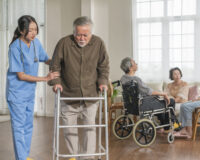Recovering after a hospital stay is a critical phase in a patient’s journey towards full health. Transitioning from hospital to home requires meticulous planning and support to ensure a smooth recovery and prevent complications.
Hospital discharge care plays a pivotal role in this process, offering patients the necessary assistance and medical attention within the comfort of their homes. A structured care plan helps in minimising risks, managing chronic conditions, and providing emotional support to patients and their families.
NHS data reveals that in 2016/17, 84 hospital trusts reported 529,318 emergency readmissions, marking a nearly 25% increase over the past four years.
What is Hospital Discharge?
Hospital discharge marks the point at which a patient is deemed medically fit to leave the hospital’s care and continue recovery at home or another facility. However, being discharged does not imply complete recovery; it signifies a shift to the next phase of healing, where continued medical attention may still be required.
Without proper hospital discharge care, patients may face challenges such as managing medications, adhering to treatment plans, and recognising signs of potential complications. Poorly planned hospital discharges can lead to hospital readmissions, which may result in additional medical expenses and prolonged recovery times.
Studies show that approximately 37% of hospitalised patients with chronic conditions in India are readmitted within 30-60 days due to inadequate post-hospitalisation care. This underscores the need for a well-structured discharge plan that ensures continuity of care.
Discharge Planning
Effective discharge planning is crucial for ensuring patients receive the necessary care after leaving the hospital. This process involves several steps:
- Assessment of Patient Needs: A detailed evaluation of the patient’s medical condition, mobility, and available support system to determine the required level of care.
- Coordination with Healthcare Providers: Collaboration between doctors, nurses, and therapists to design a personalised care plan.
- Medication and Treatment Plan: Ensuring that patients and caregivers understand their prescribed medications, potential side effects, and the importance of adherence.
- Education and Training: Providing patients and their families with instructions on wound care, diet modifications, mobility exercises, and recognising warning signs that require medical intervention.
- Follow-up Appointments: Scheduling visits with healthcare providers to monitor the patient’s progress and make necessary adjustments to the care plan.
According to the Ministry of Health and Family Welfare, India has launched several initiatives to improve post-hospital care, including telemedicine consultations and home-based medical services. These efforts aim to enhance hospital discharge care and reduce preventable hospital readmissions.
Continuity of Care
Maintaining continuity of care post-discharge is essential to prevent complications and ensure a seamless transition from hospital to home. This involves:
- Regular Follow-ups: Scheduled consultations with healthcare professionals to track recovery progress and detect potential health issues early.
- Consistent Communication: Ensuring hospital staff, primary care physicians, and home care providers share vital information to provide unified care.
- Personalised Care Plans: Tailoring treatment approaches to each patient’s medical history, lifestyle, and specific needs to improve overall health outcomes.
- Support from Family and Caregivers: Educating family members about their role in the patient’s recovery, including medication management, hygiene assistance, and emotional support.
Studies suggest that implementing structured hospital discharge care can reduce readmission rates.
Community Care Services
Community-based care services play an essential role in supporting patients after hospital discharge. These services include:
- Support Groups: Connecting patients with others facing similar health challenges to share experiences, coping strategies, and emotional encouragement.
- Counselling Services: Providing mental health support to help patients and their families cope with the stress and anxiety of recovery.
- Rehabilitation Services: Offering physiotherapy, occupational therapy, and speech therapy to aid in the restoration of physical and cognitive functions.
- Transportation Assistance: Facilitating access to follow-up medical appointments, therapy sessions, and community health resources.
- Nutrition and Diet Guidance: Ensuring patients receive appropriate dietary advice to support healing and overall well-being.
By integrating community care services with hospital discharge care, patients receive a well-rounded support system that enhances their recovery process.
Home Care Services
Home care services provide professional medical and personal care within the patient’s residence, offering a more comfortable and convenient recovery environment. These services include:
- Home Nursing Services: Trained nurses administer medications, manage wounds, monitor vital signs, and provide specialised care for chronic conditions.
- Patient Care Takers: Skilled caregivers assist with daily activities such as bathing, dressing, feeding, and mobility support.
- Physiotherapy at Home: Physical therapy services to aid in rehabilitation and improve mobility for patients recovering from surgeries, strokes, or injuries.
- Medical Equipment Support: Providing and managing essential medical equipment such as oxygen cylinders, ventilators, and hospital beds.
- Palliative and End-of-Life Care: Ensuring compassionate support for patients with serious illnesses, focusing on pain management and comfort.
Choosing home nursing services allows patients to recover in a familiar environment, reducing stress and improving overall health outcomes.
Care After Hospital Discharge with Care For You India
Recovering after a hospital stay requires continuous support and personalised care. Care For You India offers comprehensive post-discharge assistance to ensure a smooth transition from hospital to home. We are committed to providing comprehensive hospital discharge care tailored to individual patient needs. Our services include:
- Senior Care: Specialised senior care services to help elderly individuals regain strength and independence with proper medical attention and daily assistance.
- Divyang Care: Tailored disability care services to support individuals with disabilities, focusing on rehabilitation, mobility assistance, and emotional well-being.
- Inpatient & Outpatient Care: Continuous monitoring, medication management, and post-surgical care to aid recovery for both inpatients and outpatients.
- Allied Health Professional Services: Access to physiotherapists, occupational therapists, nutritionists, and other specialists to enhance recovery and improve overall health.
- Home Health Care Services in Ahmedabad: For residents in Ahmedabad, CFYI provides professional home nursing services, ensuring accessible and efficient care in the city.
By opting for CFYI’s services, patients benefit from expert hospital discharge care that enhances their recovery journey and overall well-being.
Conclusion
The period following hospital discharge is a crucial phase in a patient’s recovery. Effective planning, continuity of care, and access to home-based and community support services significantly reduce the risk of complications and hospital readmissions.
Hospital discharge care plays a pivotal role in ensuring a smooth transition from hospital to home by addressing medical, emotional, and logistical challenges. Care For You India is a trusted partner offering tailored solutions that prioritise patient comfort and recovery. By utilising professional hospital discharge care, patients can experience a safer and more effective recovery journey, leading to improved long-term health outcomes.





